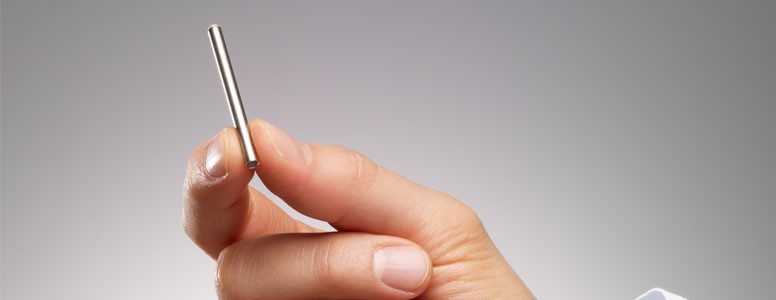A nine-month trial shows that ITCA 650, a mini-pump that delivers a GLP-1 receptor agonist drug without requiring injections, has performed well in reducing blood sugar and body weight.
ITCA 650, developed by Intarcia Therapeutics, uses the Medici Drug Delivery System which involves having a very small device implanted underneath the skin. The device is smaller than the size of a matchstick but is able to deliver the diabetes medication exenatide for between 3-6 months before needing to be replaced.
Exenatide is a GLP-1 receptor agonist drug that is prescribed to people with type 2 diabetes under the drug names Byetta and Bydureon when in injectable form. Exenatide helps to improve blood sugar levels after meals by increasing insulin secretion after meals whilst inhibiting glucagon secretion. It also helps weight loss by slowing down digestion and decreasing appetite.
GLP-1 receptor agonist drugs have been effective, but they need to be injected on a regular basis. Some people cope well with injections, but others find injections much more difficult than taking tablet medication. An advantage of the mini-pump is that it does not require injections and works automatically so, unlike injections, it does not need to be remembered.
The trial involved 60 adults with type 2 diabetes and high HbA1c levels of between 86–108 mmol/mol (10-12%). All the participants had a BMI of over 25 kg/m2.
The participants were implanted with ITCA 650 at the start of the trial. They received a dose of 20 micrograms per day for the first 13 weeks and then the dose was stepped up to 60 micrograms for the next 26 weeks. HbA1c levels and body weight were assessed after nine months (39 weeks).
At the end of the study, the results showed that the average reduction in HbA1c was 30 mmol/mol (2.8%). Nine out of 10 participants experienced a reduction in HbA1c of equal or greater than 11 mmol/mol (1%). Furthermore, one in four were able to reduce their HbA1c down to under 53 mmol/mol (7%).
Compared to the reduction in sugar levels, the effect on body weight was a more modest average reduction of 1.2 kg.
Side effects experienced during the study included nausea, diarrhea, vomiting and headache. These side effects are common for people taking GLP-1 receptor agonist drugs and the good news is that the side effects subsided through the study. Only one in 15 participants had to discontinue taking part in the study.
The trial, which is a phase III trial, shows promise for being effective at treating people with type 1 diabetes that have struggled to manage their blood sugar levels.
The study is published online, ahead of print, by the Diabetes Care journal.
What's new on the forum? ⭐️
Get our free newsletters
Stay up to date with the latest news, research and breakthroughs.







